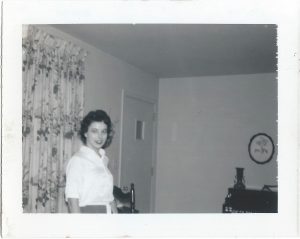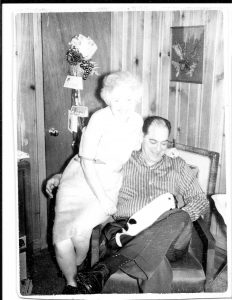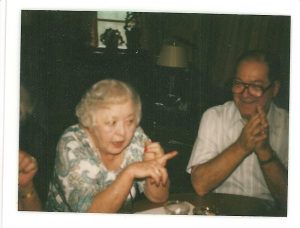I grew up in a neighborhood that didn’t require locking the door at night, its houses nestled deep in a forest of centuries-old trees, decorated with more wisteria than anyone could imagine. The neighbors were either young families with babies toddling about their yards, or older, retired couples, their American
flags waving gently in the wind on their porches. My parents’ house, built in the earlier half of the 20th century, stood at the end of our quiet neighborhood, its yard punctuated by a tall lamppost my great-grandfather probably would have placed by the driveway when he and my great-grandmother moved in. The house had been theirs before it was ours, inhabited by their lives and their laughter after their retirement in the late 1960s.
Their place of rest was then their daughter’s after they passed. She was my grandmother, Sandra, who graced its hardwood floors with warmth and light, her numerous dachshunds napping wherever they pleased. Her husband, Donald Forrest Hardy, Sr., was a joy as well.

The house was very much my family’s in every way, but I never knew my great-grandparents, Bill and Alda, the first keepers of the home that had been so special to me throughout my life. A family feud over the possession of the house led to explanations from my parents about why we would have our own Christmas celebration that year instead of attending my family’s. Old photos and factual Ancestry records were all I had of my father’s family as a child, so I asked questions constantly about things they would have done, experiences they would have had in the house we loved so much. Naturally, as I grew up, I began to use my budding writing skills to create a world of my great-grandparents’ that might’ve been completely different from reality, but it was mine. It was real to me. My great-grandfather, William Calvin Jones, known as Bill to my father and his siblings, was the most fascinating subject of my tales.
The only thing I can remember learning as a child about Bill is that he was a pressman by trade. Although simple, this fact became the foundation of my stories. When I began researching for this class, however, I was under the impression that a pressman was equivalent to a journalist. Writing, researching, attending, community functions, office work, other civil functions of the same boring nature. Bill was much different than that, I soon came to discover. Pressmen were operators of the press machines, humorous communities of hardworking men who knew how to get greasy and dirty just as well as they knew how to tell a good joke. Bill worked for the Birmingham News, a newspaper based in my hometown that would provide news to the Alabamians of Birmingham for years to come. Historically known as the Birmingham Post Herald, currently known as the Birmingham News, and occasionally searched as “al.com,” this newspaper was the heart and soul of my family’s community for years, and still is today.
Bill was from Georgia originally, born to his parents William Calvin Jones Sr. and Maude Elizabeth Harris in 1904. His mother was 29 when she had him, making her rather old for child-bearing at the time. According to my Ancestry research, Bill was one of ten children in his family, which ensured that money would be a struggle throughout his childhood. I imagine that a family living in Macon during the early 1900s, as in Bill’s case, would have had to stretch their finances to provide for every member of their family. Bill eventually moved to Birmingham, Alabama, to begin his career, which was fairly steady and reasonable for a man of his social status, but Bill was focused on his community. After he married Alda Whaley Jones in 1928, Bill knew his job would take him places. Although the newlywed couple moved to Chicago in the mid 1930s, their life in the South at the bookends of the decade inevitably remains the focus of my research. The Great Depression gives perspective to these events unlike anything else in their lives, and I am consistently in awe of their great tenacity in the face of struggle. Even though my great-grandparents did not live in the family house until the 1970s, growing up in their home has been the foundation of my connection with the couple, so it frames my imagination of what their lives would have been like during the Great Depression. Their roots still grow in my family, considering that my parents bought Bill and Alda’s house from Bill’s remaining grandchildren at the time of their death.

Bill’s life in Birmingham with Alda during the Great Depression would have been largely family-based. Spending money on outings and excursions would have been hard for the couple, so before they had their first daughter, my grandmother Sandra, they would have used plenty of tactics to entertain themselves while remaining as frugal as possible. When Bill came home from work at night, Alda would have most likely had meals ready for the two of them, given that she was a housewife and a homemaker. I like to think that my great-grandparents were more progressive, though, so I imagine Bill and Alda cooking dinner together in their downtown Birmingham kitchen. Although my great-grandparents were not farmers and did not live in a rural area, the couple was still deeply Southern.
A typical dinnertime meal for a small family would have been soups that were easy to keep for leftovers, creamed chicken and biscuits, and homemade bread with some type of slow-cooked greens (Ganzel). If Bill assisted Alda with the meals as I like to think he would have, the two would have begun by rolling out biscuit dough with a rolling pin (or anything else they might have had handy around the house), baked it in the oven after rolling it out into the desired shape, and them piecing apart some type of meat to add to cream and milk before cooking it over the stove with salt, pepper and other desired spices. These recipes would have been supplemented by conversation between the pair, laughing and joking about the way their days progressed throughout all the seasons of life they spent together. Although Alda spent her time in the household, I know Bill would have been extremely overwhelmed by the amount of love she showed him by managing their home affairs while he worked.
After eating dinner, the couple’s next step would have been to straighten up the house before preparing for the next day of work. Bill’s role would have likely been mowing the grass and doing yard work. During the Great Depression, the most popular type of lawnmower mower would have been the new and expensive gasoline-powered mower, but these types of luxuries would not have been reasonable for a family like the Joneses (“History of the Lawnmower”). My parents still own the motorless mower that I believe belonged to Bill during those years of hardship, and even though it has been rusted by time, my own father trusted me to use it when I was a teenager and the yard needed attention. Rather than letting my his 15 year-old daughter attempt to use the expensive gas mower, my father resorted to the tried and true appliance that Bill sweated over for so many years.
Bill and Alda’s yard in downtown Birmingham is small, but the grass would have been hard to work with during the financially-wracked times of the Great Depression, as most families did not have the funds to fertilize or weed their lawns (“History of the Lawnmower”). They were focused on feeding their families, not purchasing expensive mowers to keep their grass looking healthy. Their highest priority was keeping themselves healthy. From the stories that I have been told about my great-grandfather, though, he was a prideful man, even if he was kind and loving to everyone around him. Taking care of his home would have been a pleasure that kept his dignity even in the hardest times, so I’m sure Alda would have gone along with his need for order. Another task that would have been important in Bill’s life was managing the finances of the Jones home. Maybe Alda would have assisted, but traditional roles often overcame the desire to be progressive. Bill would have looked for ways to pinch pennies for his family, and the most obvious of these would have been to take care of the yard work himself, as he did. These types of money-saving strategies would have been important for their wellbeing, but also to encourage community within their family and friends, since they lived so near to the heart of Birmingham.

I have never felt closer to a family member than I have when writing stories about my great-grandfather. Even though he passed nearly a decade before I was born, Bill’s legacy lives on through my family’s home in Cahaba Heights. I feel his presence now, stronger than ever after all the research I have done about his life, when I return home to visit my family in the same house that he lived in. There is no greater joy than seeing my eight year-old brother, who is named after my great-grandfather, grow up in the same environment in which Bill spent his last years. Even though Bill and Alda did not live in our home during the Great Depression, I am so deeply encouraged by the connection I have to the deeply-rooted joy that they acquired from struggling through such a difficult time together. I can only hope that one day, my siblings and I will have the same connection with our great-grandchildren. Family is everything.
Works Referenced
Ganzel, Bill and Claudia Reinhardt. “Feeding the Family During the Great Depression.” Wessels Living History Farm, 2003, www.livinghistoryfarm.org/farminginthe30s/life_04.html. Accessed 4 April 2018.
“History of the Lawnmower.” American Lawns, www.american-lawns.com/history/history_mower.html. Accessed 4 April 2018.